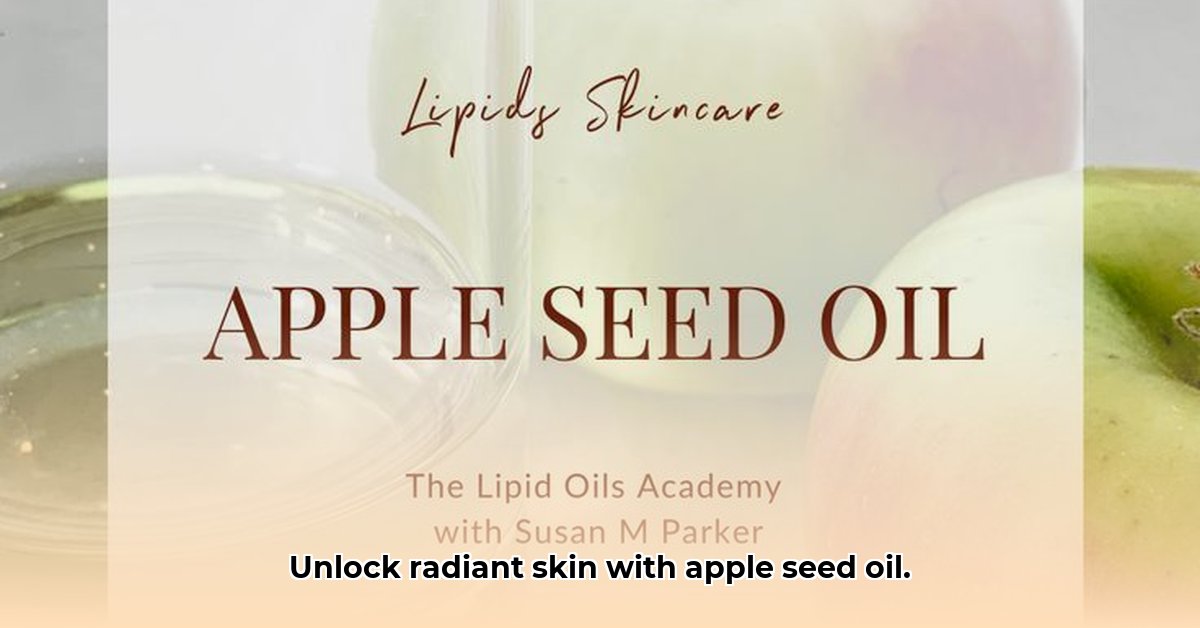
Apple seed oil, a natural extract from apple seeds, is gaining popularity in the skincare world. But does it deliver on its promises of radiant skin? This guide will explore the potential benefits, address the limitations of current research, and provide a safe and effective approach to incorporating apple seed oil into your skincare routine.
Understanding Apple Seed Oil's Potential Benefits
Apple seed oil is rich in fatty acids, such as oleic and linoleic acid, and antioxidants. These components contribute to its potential skin-loving properties. Many users report improved skin hydration, softness, and elasticity. Some anecdotal evidence suggests it may also help with acne and stretch marks. However, it's crucial to remember that more robust scientific research is needed to definitively confirm these claims. While promising, the existing evidence is largely preliminary and based on small studies or personal accounts.
Separating Fact from Fiction: What the Research Says
While early studies and user testimonials suggest potential benefits, we must approach claims with caution. Currently, there is insufficient scientific evidence to definitively state that apple seed oil prevents sun damage or significantly boosts collagen production. These are important considerations—we need larger, more rigorous clinical trials to verify these more impactful claims. Responsible marketing should reflect this uncertainty.
Is apple seed oil a miracle cure-all? The answer, based on current scientific understanding, is no. However, its potential benefits warrant further investigation.
Does apple seed oil offer moisturizing benefits? Early evidence suggests potential for hydration, but more research is essential.
How does apple seed oil compare to other facial oils? Further comparative studies are needed to fully assess its efficacy against established skincare oils.
Choosing and Using Apple Seed Oil Safely: A Step-by-Step Guide
If you're interested in trying apple seed oil, prioritize safety and responsible usage:
1. Selecting High-Quality Apple Seed Oil:
- Look for "Cold-Pressed" and "Unrefined": These methods generally preserve more of the beneficial components.
- Check for Quality Certifications: Opt for certified products from reputable organizations to ensure product purity and quality.
- Read Reviews: Compare reviews and ratings from various brands before making a purchase.
2. Safe Application:
- Perform a Patch Test: Before applying apple seed oil to your face or body, apply a small amount to an inconspicuous area (like your inner arm) and wait 24-48 hours to check for allergic reactions (redness, itching, or rash). This crucial step helps prevent potential adverse reactions.
- Start Slowly: Begin with a minimal amount and gradually increase application as tolerated.
- Gentle Application: Apply gently using circular motions, avoiding harsh rubbing.
- Consistent Use: For optimal results, use the oil consistently as part of your skincare routine.
3. Potential Side Effects: While rare, allergic reactions (itching, rash, redness) are possible. Discontinue use immediately if any adverse reactions occur. Remember, unprocessed apple seeds contain amygdalin, a toxic compound. Properly refined oil should not contain amygdalin, but it should never be ingested.
Incorporating Apple Seed Oil into Your Skincare Routine
Apple seed oil can be incorporated into your existing routine in several ways:
- As a Moisturizer: Apply a small amount after cleansing and before applying other products.
- As a Serum: Use it before your moisturizer for added hydration.
- As a Makeup Primer: Some find it helps create a smoother base for makeup.
Remember to consult a dermatologist if you have persistent or severe skin issues. Apple seed oil is not a replacement for professional medical advice.
The Bottom Line: A Balanced Approach
Apple seed oil offers promising potential benefits for skin health, but more definitive research is needed to confirm its efficacy for specific claims. Choose high-quality products, perform a patch test, start with small amounts, and monitor your skin for any adverse reactions. Combine it with a healthy lifestyle and other proven skincare practices for the best results. While exciting, always maintain realistic expectations. A balanced approach to skincare, incorporating a variety of healthy habits and seeking professional advice when needed, remains the most effective strategy.